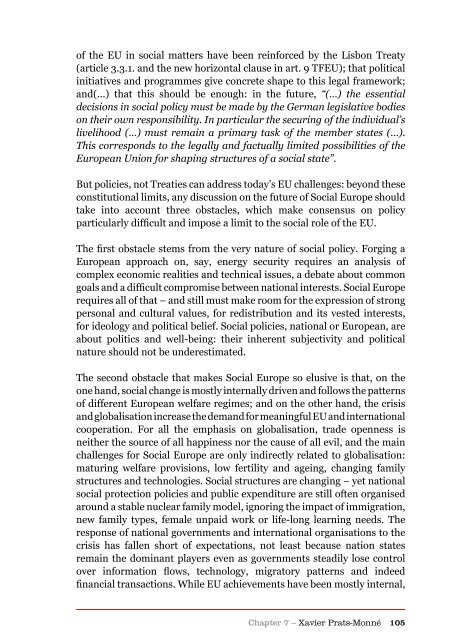Authors Iain Begg | Gabriel Glöckler | Anke Hassel ... - The Europaeum
Authors Iain Begg | Gabriel Glöckler | Anke Hassel ... - The Europaeum
Authors Iain Begg | Gabriel Glöckler | Anke Hassel ... - The Europaeum
You also want an ePaper? Increase the reach of your titles
YUMPU automatically turns print PDFs into web optimized ePapers that Google loves.
of the EU in social matters have been reinforced by the Lisbon Treaty<br />
(article 3.3.1. and the new horizontal clause in art. 9 TFEU); that political<br />
initiatives and programmes give concrete shape to this legal framework;<br />
and(...) that this should be enough: in the future, “(…) the essential<br />
decisions in social policy must be made by the German legislative bodies<br />
on their own responsibility. In particular the securing of the individual’s<br />
livelihood (…) must remain a primary task of the member states (…).<br />
This corresponds to the legally and factually limited possibilities of the<br />
European Union for shaping structures of a social state”.<br />
But policies, not Treaties can address today’s EU challenges: beyond these<br />
constitutional limits, any discussion on the future of Social Europe should<br />
take into account three obstacles, which make consensus on policy<br />
particularly difficult and impose a limit to the social role of the EU.<br />
<strong>The</strong> first obstacle stems from the very nature of social policy. Forging a<br />
European approach on, say, energy security requires an analysis of<br />
complex economic realities and technical issues, a debate about common<br />
goals and a difficult compromise between national interests. Social Europe<br />
requires all of that – and still must make room for the expression of strong<br />
personal and cultural values, for redistribution and its vested interests,<br />
for ideology and political belief. Social policies, national or European, are<br />
about politics and well-being: their inherent subjectivity and political<br />
nature should not be underestimated.<br />
<strong>The</strong> second obstacle that makes Social Europe so elusive is that, on the<br />
one hand, social change is mostly internally driven and follows the patterns<br />
of different European welfare regimes; and on the other hand, the crisis<br />
and globalisation increase the demand for meaningful EU and international<br />
cooperation. For all the emphasis on globalisation, trade openness is<br />
neither the source of all happiness nor the cause of all evil, and the main<br />
challenges for Social Europe are only indirectly related to globalisation:<br />
maturing welfare provisions, low fertility and ageing, changing family<br />
structures and technologies. Social structures are changing − yet national<br />
social protection policies and public expenditure are still often organised<br />
around a stable nuclear family model, ignoring the impact of immigration,<br />
new family types, female unpaid work or life-long learning needs. <strong>The</strong><br />
response of national governments and international organisations to the<br />
crisis has fallen short of expectations, not least because nation states<br />
remain the dominant players even as governments steadily lose control<br />
over information flows, technology, migratory patterns and indeed<br />
financial transactions. While EU achievements have been mostly internal,<br />
Chapter 7 – Xavier Prats-Monné 105

















